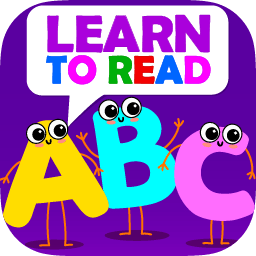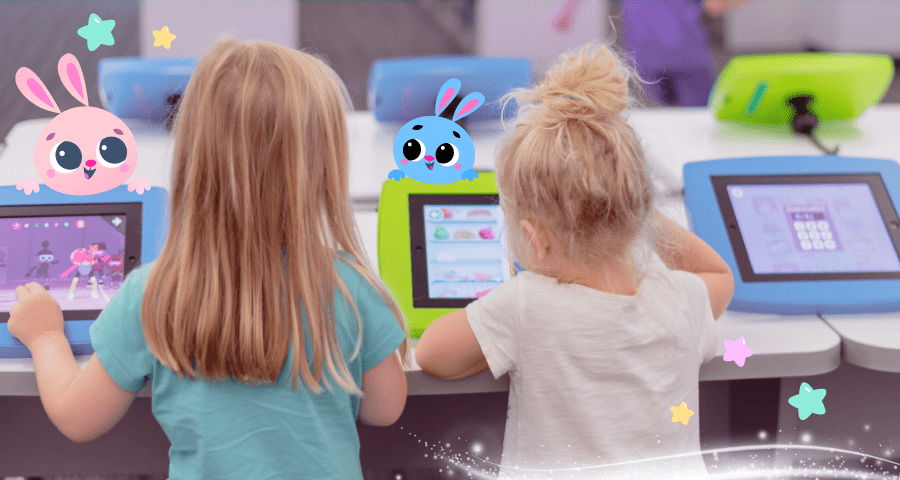Cooperative play is a crucial aspect of childhood development, helping children build social, communication, and problem-solving skills. But what exactly is a cooperative game, and how can parents promote it? Let’s explore the concept and discover six fun activities for your child.
Cooperative Play Definition
Cooperative play is a stage in a child’s development where they communicate, share, and work together toward a common goal. Unlike parallel play, where children play side by side without much interaction, cooperative play requires teamwork, problem-solving, and mutual understanding. This stage usually begins around the age of four or five, as children’s social and communication skills become more advanced.
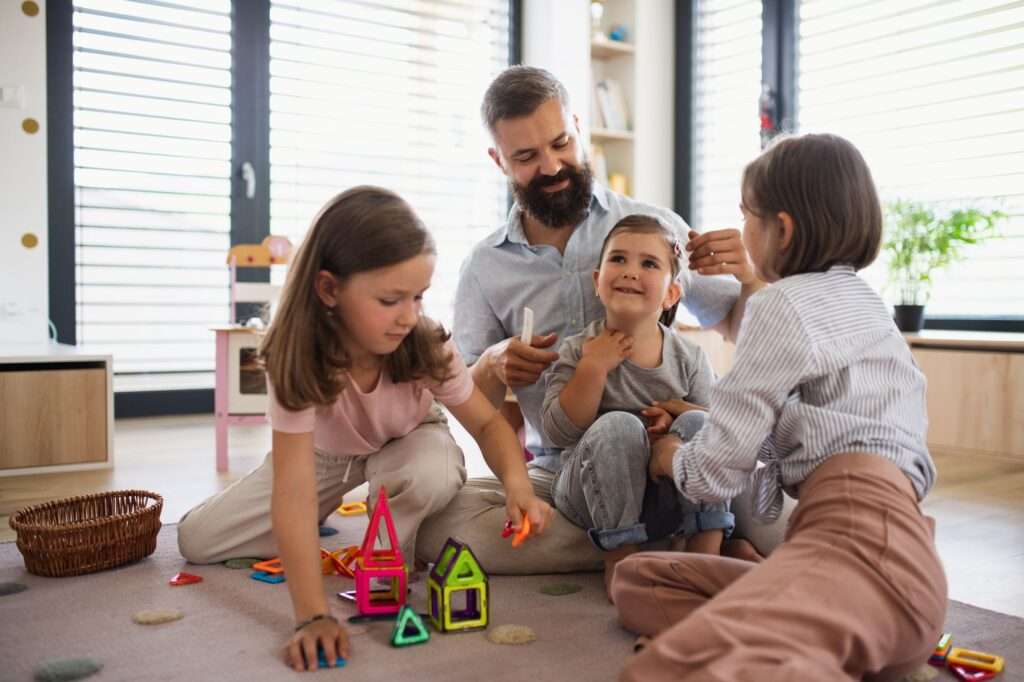
Collaborative Play vs. Independent Play
Play Both types of play are important for a child’s growth. Independent play helps children be creative and solve problems on their own. On the other hand, cooperative play teaches children how to:
- Communicate and share ideas
- Listen to others and understand their point of view
- Solve problems and be patient
- Work together to achieve goals
Through cooperative play, children also learn to manage their emotions, share, and celebrate team success.
Cooperative Play Definition Child Development
- 1-2 years (Toddlers): At this age, toddlers are just learning simple concepts like taking turns. Simple games like rolling a ball back and forth help them practice these skills.
- 3-5 years (Preschoolers): Preschoolers start to play more organized games, like building together with blocks or pretending as a group. They begin to understand how to work as a team.
- 6+ years (School-age kids): Older children can play more complex games with rules, like board games, team sports, and group activities that involve solving problems together.
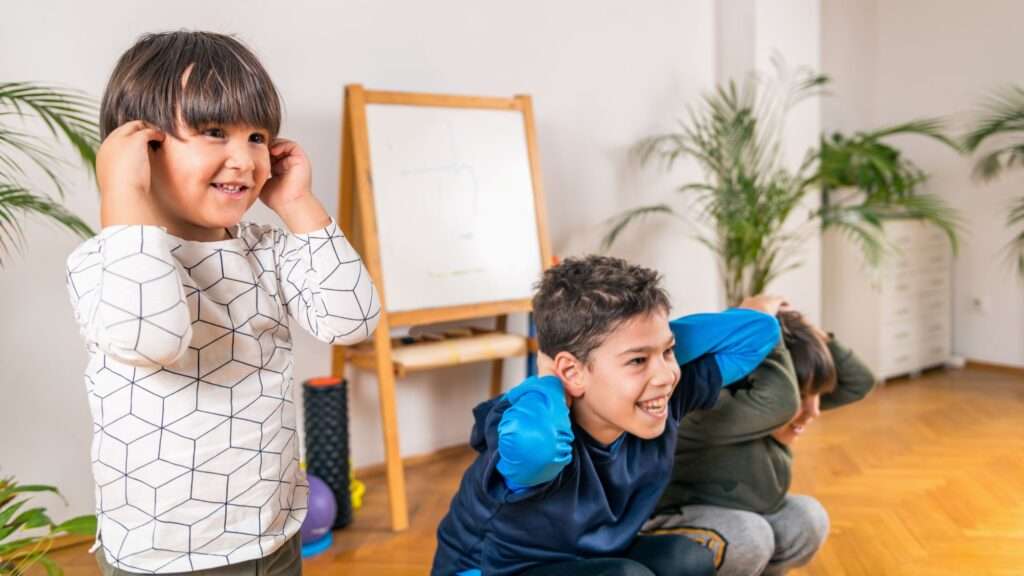
Define cooperative play: What It Is and What It Isn’t
Cooperative play is often confused with other forms of play, such as:
- Parallel Play. Parallel to playing, children play next to each other but do not interact meaningfully. They can play with similar toys or do similar activities, but isolated. “In the park, my daughter and her friends built their own sandcasts in every different place. Although they may have used the same device, they did not talk to each other or share ideas. It was fun, but he didn’t work,” says Emily, a 4-year-old mother.
- Competitive Play. In competitive play, children engage in games that have winners and losers, often focusing on individual success rather than teamwork. “My son loves playing tag with his friends, but he gets so focused on being ‘it’ that he forgets to think about how everyone is having fun. It’s a great game, but it’s not cooperative,” says Anna, mother of a 5-year-old.
- Associative Play. In associative play, children play near each other and may share toys or materials, but they do not work toward a common goal. “At playdates, my daughter and her friend often share toys and talk, but they don’t really work together to make anything. They’re playing side by side, not collaborating,” says Mark, father of a 3-year-old.
Cooperative Play Examples: 6 Exciting Games to Try
Here are six games you can try to help your kid practice working together:
- Building Together
- Materials: Blocks, LEGO, or building toys.
- How to Play: Choose something to build (like a castle). Divide the tasks (one builds the walls, another the roof) and talk about ideas together.
- Try: “What do you think we should build together? Should we make it big or small? Can you help your brother with the walls while I work on the roof?”
- Treasure Hunt
- Materials: Small treasures and clues.
- How to Play: Hide treasures around the house or yard. Write clues that need teamwork to solve and follow to find the next treasure.
- Try: “Who do you think will be the best at finding the next clue? How can you both work together to solve the puzzle?”
- Obstacle Course Challenge
- Materials: Household items to create obstacles.
- How to Play: Set up a fun obstacle course and have your kids help each other complete it. You can even assign roles like “leader” and “helper.”
- Try: “Who wants to be the leader this time? Can you help your sister get through this obstacle? What do you think the next challenge should be?”
- Giant Art Project
- Materials: Large paper, crayons, markers, or paints.
- How to Play: Let each child add to a big picture, discussing how their parts fit together. If there’s a disagreement, encourage them to compromise.
- Try: “What do you think we should draw together? How can we make this picture bigger or better? Can you help your brother add something to the drawing?”
- Follow the Leader
- Materials: Just space to move!
- How to Play: One child leads by doing actions (like jumping or twirling) and others follow. Switch roles after a few rounds.
- Try: “Who wants to be the leader? What cool moves can you show the others? Can you follow your sister and copy her jump?”
- Group Puzzle Activity
- Materials: A jigsaw puzzle.
- How to Play: Work together to finish the puzzle. Assign sections, but make decisions as a group about where the pieces go.
- Try: “Can you both work on different parts of the puzzle? Which pieces do you think go together? How can we finish the puzzle faster by working together?”
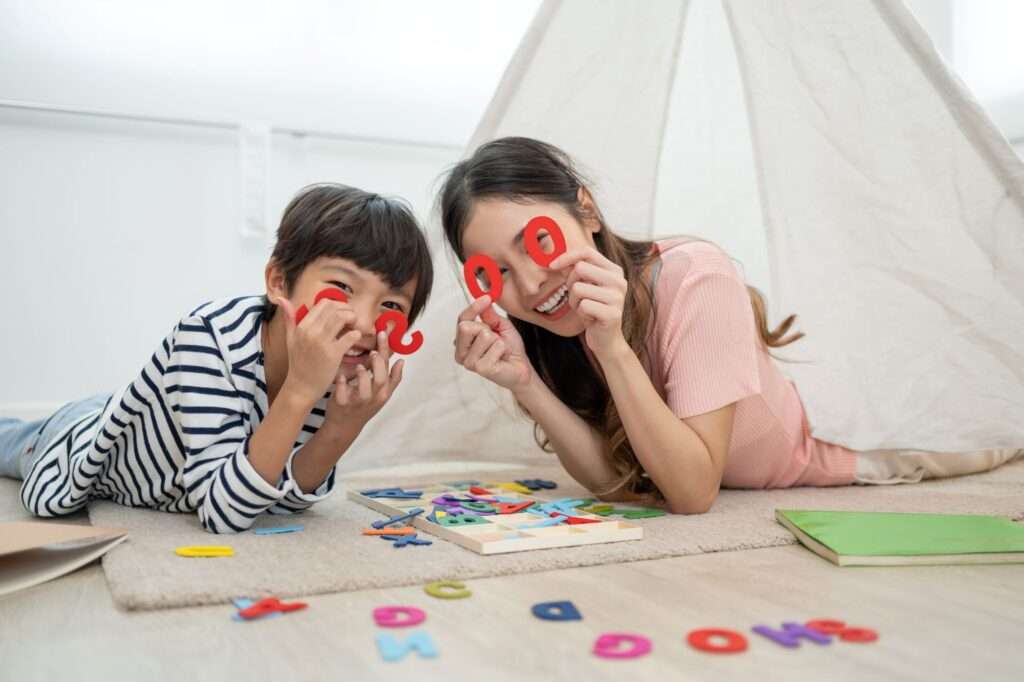
Cooperative Play Skills
Through cooperative play, children develop essential life skills, such as:
- Communication: Expressing thoughts and listening to others
- Patience & Turn-Taking: Learning to wait and share
- Empathy: Understanding teammates’ feelings and perspectives
- Leadership & Teamwork: Taking initiative and contributing to a group effort
- Conflict Resolution: Managing disagreements in a constructive way
These skills lay a foundation for future social interactions and teamwork in school.
How to Engage Your Kid in Cooperative Play
- Give Clear Instructions: Explain what to do before starting.
Tip: Keep it simple and remind them to work together. - Model Cooperation: Show your child how to share and help others.
Tip: Be a role model by working together at home. - Plan Group Activities: Set up activities that need teamwork.
Tip: Organize playdates or family games. - Encourage Sharing & Taking Turns: Praise your child when they share or wait their turn.
Tip: Use fun games that involve sharing toys. - Celebrate Teamwork, Not Winning: Focus on how they worked together.
Tip: Cheer for teamwork, not just the finish line!
- Give Clear Instructions: Explain what to do before starting.
Cooperative play isn’t just about having fun—it’s about building lifelong social skills. For example, during pretend play, children often learn how to share ideas and work together to create stories. Encouraging your child to engage in group activities fosters emotional intelligence, empathy, and teamwork. So, grab some friends, set up a game, and watch your young explorer learn, grow, and connect!




